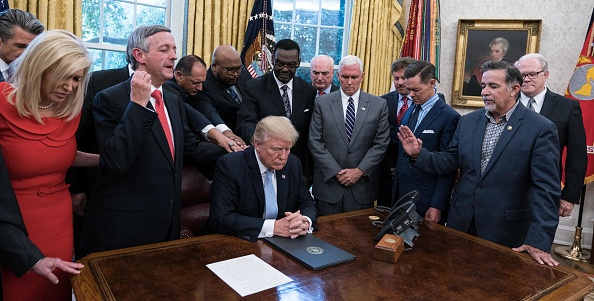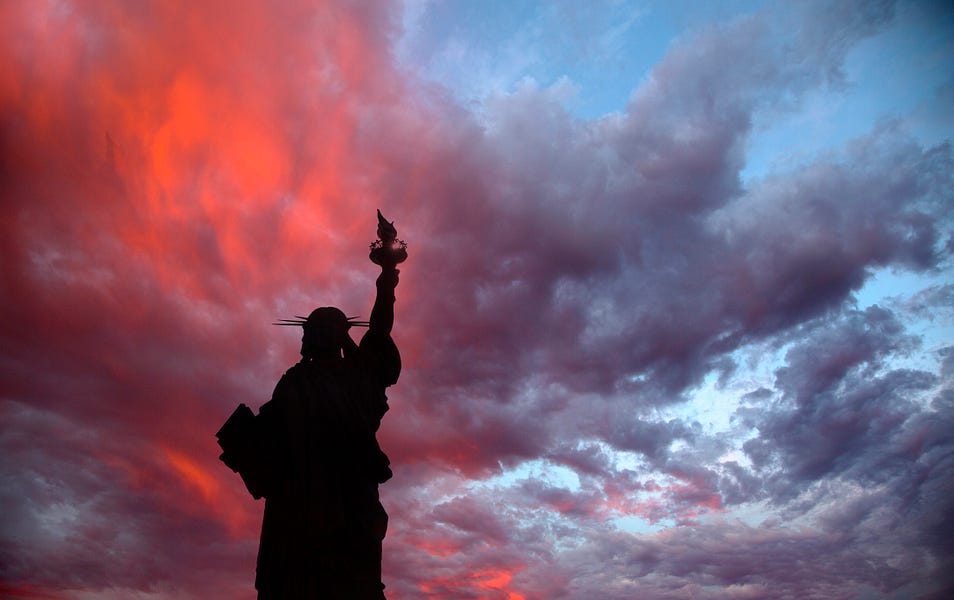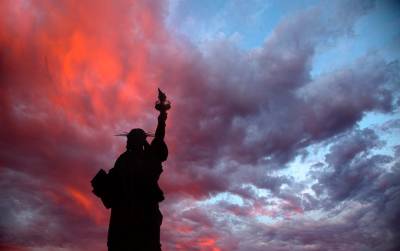One of the less-told aspects of the run-up to the 2016 election is the extent to which Christian public figures lobbied each other in private correspondence to support or reject Donald Trump. The public saw the competing op-eds. My inbox filled with personal pleas. And if I had to identify the most common argument—one that was often different from the attempts to mobilize the public through fear of Hillary Clinton—it was an appeal to Evangelical Christian power.
“The Trump administration is going to hire thousands of people. We’ll fill his administration with conservative believers.” That sounds crass, but there was always an “and.”
“And that means we’ll pass better regulations, confirm better judges, and halt the secular left in its tracks.” The pursuit of power would yield justice, but there could be no justice without power.
The Trump administration delivered the power. The top levels of the bureaucracy filled with Evangelicals, and the administration granted an almost unprecedented amount of access to Evangelical activists. During the 2020 campaign, it was routine to read ministry leaders sharing their “personal” insights into Trump based on time spent in the Oval Office.
Images of Trump surrounded by large numbers of praying Christians sent a clear message to the Evangelical public: Look how many of us are in the room where it happens. The word got out—no president in modern times had been more welcoming to Christian ministries. No president has granted Christians greater access.

There were some good things that happened. Not all the Christians in power were ineffectual enablers, justice did advance on a few key fronts, and we can be grateful in some cases for the courageous service of men and women who stepped into the breach in vital places and vital times to quite literally save the republic from even worse emergencies than the considerable crises we faced.
Yet five years later, as our nation picks up the pieces from one of the most divisive, cruel, and incompetent administrations in the modern history of the United States—one in which the pursuit of Christian power led to prominent Christian voices endorsing nation-cracking litigation and revolutionary efforts to overturn a lawful election—the Christian “deal” looks bad indeed. When push came to shove, all too often the pursuit of justice yielded to the pursuit of power.
The cultural shockwaves are still being felt. They’re rearranging not just America’s political alignments but our language itself. Is “Evangelical” more of a political marker than a religious identifier? Does it even carry true religious meaning any longer? What is a “conservative”? Where I live, the term “staunch conservative” is a synonym for “Trump supporter,” in spite of the fact that Trumpism is far more akin to populism than conservatism, as traditionally defined.
Then there’s this other word: “patriot.”
I’ve always considered myself a patriot. I’ve defended our nation’s Constitution in courtrooms across the land. I put on the uniform of my country and deployed overseas. Indeed, as C.S. Lewis explained in his book The Four Loves, a proper kind of patriotism can be deeply virtuous. A “love of home—the love of the place where we live” can lead to greater selflessness. As Lewis writes, “As the family offers the first step beyond self-love, so this offers us the first step beyond family selfishness.”
Then I saw Christian nationalists marching in a “Jericho March.” Later I saw them swarm over the Capitol on January 6. I heard Evangelicals spin out wild conspiracy theories about the election, and I heard how they described themselves. “Patriots.” Indeed, that word has become the short-hand cultural marker for Trumpist Christian nationalism.
“We’ve got a lot of patriots on this flight to D.C.”
“Solid patriots are working on the vote audit.”
“Don’t worry about the county GOP, we’ve got patriots on the board.”
I want all those words back. “Evangelical” is a word with a rich theological and historical tradition. It has meant something good. The word “conservative” has long been connected to the defense of the classical liberal virtues of the American founding. And I can think of no better time to reclaim the word “patriot” than on our nation’s Independence Day.
No, it’s not just that I “want” those words back. We need them back. By appropriating those words, Christian nationalists and Trumpist populists enjoy the afterglow of their virtues. They deceive many Americans into believing they’re something they’re not. And so Americans follow movements they don’t fully understand, thinking those movements are better than they truly are.
So let’s focus on the true meaning of words and the distinctions that truly matter. Can a Christian be a patriot without becoming a Christian nationalist? Yes. Of course. But if Christian patriotism isn’t Christian nationalism, then how do Christian patriots love their nation well?
I’d suggest the answer is found all over the Bible—a book that speaks to all believers over all time in all nations. And if there is one consistent theme for our role as citizens, it’s summed up in two words: Seek justice.
I love Isaiah 1:17. “Learn to do good,” it says, “seek justice, correct oppression; bring justice to the fatherless, plead the widow's cause.” Most readers know one of my favorite verses, Micah 6:8: “He has told you, O man, what is good; and what does the Lord require of you but to do justice, and to love kindness, and to walk humbly with your God?”
One of the reasons why I celebrate the founding of this nation is that the core principles of the founding documents (as opposed to the often unjust reality of the new nation) represent a concrete, long-term commitment to creating a just society. “All men are created equal” is a declaration that resonates with scripture. When the Bill of Rights protects free speech, religious freedom, due process, and defends citizens from cruel and unusual punishment, it upholds fundamental human rights. The Civil War Amendments’ commitment to equal protection under the law and the eradication of human bondage are indispensable to a just society.
In his seminal 2020 essay on Justice in the Bible, pastor and theologian Tim Keller declared God a “God of justice” and identified four key characteristics of biblical justice: “Radical generosity, universal equality, life-changing advocacy for the poor, and asymmetrical responsibility.” I’d urge you to read the entire essay for a more complete explanation of each concept, but in short they mean the following:
Radical generosity (here Keller quotes Biblical scholar Craig Blomberg) “suggests a sharp critique of 1) statism that disregards the precious treasure of personal rootage, and 2) the untrammeled individualism which secures individuals at the expense of community.” Rather, out of love of God and love of neighbor, “The righteous are willing to disadvantage themselves to advantage the community; the wicked are willing to disadvantage the community to advantage themselves.”
Universal equality “requires that every person be treated according to the same standards and with the same respect, regardless of class, race, ethnicity, nationality, gender, or of any other social category.”
Life-changing advocacy for the poor. Here’s Keller. “While we are to treat all equally, and not show partiality to any, we are to have special concern for the poor, the weak, and the powerless. Proverbs says “Speak up for those who cannot speak for themselves… Defend the rights (sadeqah) of the poor and needy.” Is this a contradiction? No. The Bible doesn’t say “Speak up for the rich and powerful.” It does not mean that the powerful are less important as persons before God. They certainly are equally as important. But they don’t need you to speak up for them. However, the poor do need you.”
Corporate and individual responsibility. Many conservative Christians grasp the necessity of individual responsibility and individual accountability, but Keller notes that corporate responsibility “is a greater reality than individualistic modern western people want to believe” and that both the New and Old Testaments are replete with examples of corporate responsibility—though it “cannot be applied indiscriminately.”
I don’t pretend that Keller’s piece represents the last word on a Christian’s definition of justice, and his categories certainly do invite debate over the personal and policy responses that best create a more just nation. However, a Christian community that is fundamentally marked by a commitment to the virtues above is fundamentally different from a community marked by partisanship.
Moreover, lest anyone think that the quest for justice depends on the attainment of power, remember this: True justice often results in the loss of authority and the empowerment of your opponents.
Consider two topics I address frequently--corruption and abuse in the church and the defense of civil liberties for all. The pursuit of accountability and justice in the church often results in a concrete loss of power and reputation for Christian institutions. Indeed, that’s one reason why those who expose sin often face such brutal blowback. “Don’t you realize,” they’re told, “that you’re feeding into the world’s attacks on the church? Don’t you know all the good this ministry does?”
Justice can require Christians to remove their own leaders from the “room where it happens” and to diminish the reach and authority of even the most powerful of their churches and pastors.
Moreover, a basic commitment to legal equality means that a Christian committed to justice will defend the rights of all citizens, not just their allies. Thus, in a real way, a commitment to legal equality in free speech, or in the free exercise of religion, or in due process will often empower your political opponents—including people you might believe to be grievously wrong—to advocate for, defend, and live out their own fundamental values.
All of this is hard. All of it is complicated. Which is why it’s absolutely vital to “walk humbly” into any debate about how best to “act justly.” By contrast, the pursuit of power has a certain simplistic purity to it, especially when you are confident that others are wrong and your own community—for all its flaws—is mostly right. But as we witnessed in the agonizing weeks between November 3 and January 6, the pursuit of power can all too easily become its own cause, even when you’re convinced the ends justify the means.
So here’s my Fourth of July proposal: Counter Christian nationalists with Christian patriots. And how does the Christian patriot love his or her nation well? Through a commitment to biblical justice that quite often means we empower others more than ourselves.
One last thing ...
Earlier this week a friend of mine, Sam Allberry, got targeted for being “woke” because he said the words below:
I don’t think what Sam said is “woke.” Or if that’s what “woke” is, then count me in. His words are true and deeply responsive to an anxious age—an age where depression and anxiety dominate so many hearts and minds. And in that spirit, I thought I’d close with this song by Judah and the Lion. The lyrics are wonderful. Enjoy:







Please note that we at The Dispatch hold ourselves, our work, and our commenters to a higher standard than other places on the internet. We welcome comments that foster genuine debate or discussion—including comments critical of us or our work—but responses that include ad hominem attacks on fellow Dispatch members or are intended to stoke fear and anger may be moderated.
With your membership, you only have the ability to comment on The Morning Dispatch articles. Consider upgrading to join the conversation everywhere.